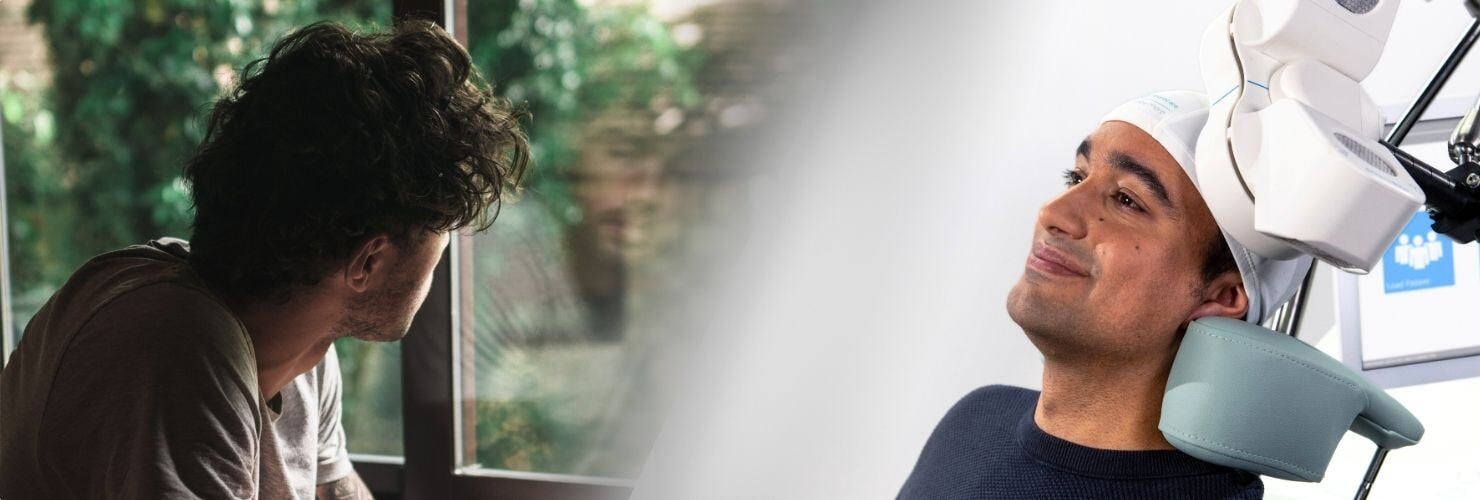TMS for depression
Transcranial Magnetic Stimulation treatment for depression

Straight to:
TMS treatment for depression was approved by the National Institute for Health and Care Excellence (NICE) in 2015. It’s a non-invasive therapy that uses magnetic pulses to stimulate the area of the brain that controls your emotional reactions and regulates mood.

Depression takes away the good things in life – your relationships, your energy, even your dreams for the future.
TMS treatment for depression can give you these things back.
Talk to us about how TMS can help.

What causes depression?
Depression affects more than 1.5 million adults in the UK. While the exact cause is unknown, it’s characterised by an imbalance of the brain’s neurotransmitters (chemical messengers that send signals between brain cells) and decreased activity in the frontal lobes of the brain.
What is depression?
Depression is more than just feeling low for a while. It is a very real illness, which has symptoms that can make life seem as though it isn’t worth living.
Although most sufferers of depression are likely to describe slightly different symptoms, most identify a strong feeling of being enveloped by sadness and hopelessness. Other symptoms may include:
- Lacking motivation
- Feeling tired and lacking energy
- Losing confidence and self esteem
- Being unable to find happiness in things that you usually enjoy
- Experiencing problems sleeping
- Losing your appetite or overeating
- Lacking concentration
- Losing your sex drive
- Having suicidal thoughts
As one of the most common mental health conditions in the UK, depression has affected as many as 1 in 4 people. The good news is that depression is treatable and you don’t need to continue to live with the debilitating symptoms any longer.
Depression treatment options
The standard treatments offered for depression are a mixture of anti-depressants and talking therapies, such as Cognitive Behaviour Therapy (CBT). If these options don’t work, your GP may refer you to a psychiatrist who can prescribe other treatments, such as Electroconvulsive Therapy (ECT).

Research has shown that Transcranial Magnetic Stimulation (TMS) can greatly improve the quality of life in many patients living with depression.
As shown below, although anti-depressants and ECT work in reducing symptoms for some patients, the side effects can often outweigh the benefits. With higher response and remission rates and fewer, less intense side effects, TMS doesn’t only manage the symptoms of depression, but treats the cause of the condition.
How does TMS work as a treatment for depression?
The treatment works by stimulating the prefrontal cortex – the area of the brain that controls mood, motivation and social skills. In particular, the left side of the prefrontal cortex is associated with positive feelings. Instead of numbing emotions, as medication can do, TMS treatment gets to the root of the problem by resetting brain patterns and pathways using targeted magnetic pulses.
Research proves TMS to be an effective, safe treatment for depression. Our team of experts have developed treatment programmes for unipolar depression, bipolar disorder, seasonal affective disorder and postnatal depression, with the aim of helping even more patients live a better quality of life, free from the symptoms of depression.
A course of TMS for depression involves 30 sessions of treatment which take place over a period of three to six weeks. Each treatment lasts 30 minutes, and some patients are able to have more than one session a day.
Smart TMS results
For patients with depression, Smart TMS use the most up-to-date techniques based on the latest scientific research. In our most recent data audit of the patients we treated for major depression:
- 49% went into remission.
- 56% had a 33% reduction in the severity of their symptoms.
Extensive research has shown Transcranial Magnetic Stimulation to be a safe and effective way to tackle depression.

TMS compared to other treatments
| Treatment | TMS | ECT | Antidepressants |
|---|---|---|---|
| Description | Non-invasive magnetic fields | Electrical current to induce seizure | Oral Medication |
| NICE approved | ✓ | ✓ | ✓ |
| Non-invasive | ✓ | ✘ | ✓ |
| Outpatient treatment | ✓ | ✘ | ✓ |
| Ongoing recovery | ✓ | ✘ | ✘ |
| Side-effects | Mild headaches Mild fatigue 1 in 50,000 risk of seizures |
Confusion Disorientation Headaches Intense sleepiness Jaw ache Anesthetic complications Memory loss Muscle aches Nausea |
Anxiety Diarrhoea Dizziness Fatigue Headache Increased appetite Migraine Nausea Nervousness Sleep problems Sexual dysfunction Weight gain |
TMS treatment costs
Assessment price
After completing your online questionnaires and confirming that TMS is right for you, you'll have a video chat with one of our expert clinicians. This session is an opportunity for you to discuss your condition in detail, ask any questions you may have, and receive personalised advice on how TMS treatment can benefit you.
The cost of this assessment is £350.
Depression and anxiety treatment prices
At Smart TMS, we recognise that a large percentage of our patients suffer from depression and anxiety alongside one another. For this reason, we treat these two conditions together within the same session.
TMS treatment for depression and anxiety is split into two courses. After 15 sessions, the results of the treatment are very apparent for most patients.
| London | Other locations | |
| Initial course (15 sessions) |
£3,750 | £3,300 |
| Second course (15 sessions) |
£3,750 | £3,300 |
| Total costs (including assessment) |
£7,850 | £6,950 |
"Everyone I dealt with was extremely friendly, helpful and supportive. Having suffered from treatment resistant depression, I feel I can now face so much of the major stressors in my life. This has been such a successful treatment for me and if you compare it to a recurring prescription of therapy, it works out so much more affordable without any side effects."
"Friendly knowledgeable staff and excellent service. The clinic in Bristol was clean and easy enough to find from the train station. I wasn't sure what to expect of the treatment but once I was used to it, it became quite relaxing and I am feeling much better than before I started. I'm looking forward to going back each month to have my top up sessions."
"The practitioner who carries out my treatment was very professional and made the whole experience stress free."
Continuous care

Dr Neal and his team understand the need to help our patients stay well beyond the end of their TMS treatment. Using research and our own experience, we have designed aftercare packages to provide ongoing care with a planned programme of regular top-up treatments.
Have you had TMS treatment for depression at another clinic? Smart TMS can offer you maintenance therapy, too.










